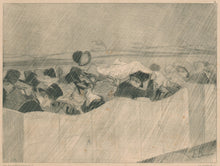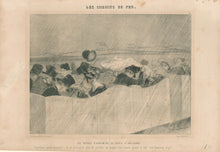Honoré Daumier. “Les Chemins de Fer. Un Voyage d'Agrement de Paris a Orléans. Saperloite quelle trempée!.. Il ne m'arrivera plus de prendre un wagon non couvert quand le ciel l'est beaucoup trop!....” Pl. 6. From Le Charivari.
Paris: 1843. 7 5/8 x 10 1/4. Lithograph on newsprint. Text on verso. With fold as issued; scattered spots; old repair in margin not affecting image. Else good condition.
Born to a glazier in Marseilles, February, 1808, Honoré-Victorin Daumier’s only education was gleaned from his amateur playwright/poet father’s readings aloud and the culture afforded by the streets of Paris. Apprenticed twice unsuccessfully, by the age of 14 he had entered the Académie Suisse to study classical art. Finding an interest in lithography, his third apprenticeship was to Zephirin Beillard at age 17. 1830 found Daumier under the editorship of Charles Philipon, one of the most creative and prolific publishers of caricatures.
The ‘July Revolution’ of 1830 had just ended most press censorship, thereby liberating the pens of other artists for Philipon’s La Caricature, and his daily, Le Charivari, first published in late 1832: Eugene Forest, Grandville, Henry Monnier, and Achille Deveria. The volatility of press regulation nonetheless led to both Philipon’s and Daumier’s receiving several months’ incarceration for sedition. Repressed by a new set of censorship laws in 1835, Daumier refined his tone to a more gentle mocking of the times’ customs and mores. The July Monarchy came to an ignoble end with the wave of revolt and revolution which swept Europe in 1848.
Spurred by the old regime’s fall, Daumier was quick to return to his satirical depiction of bloated and corrupt ministers, pitiless attorneys and scoundrel financiers. Four years later, by decree of Louis Napoleon, the list of press offenses was lengthened and penalties made more severe. As early as 1864 he began warning of Prussia’s aggressive militarism. Proven correct by the Franco-Prussian War of 1870 and the occupation of Paris, Daumier retired in 1872 on a national pension to his summer home at Valmondois, where he died in 1879.





